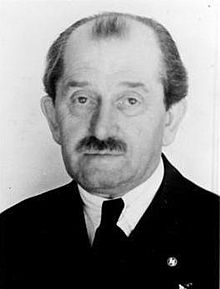Ferdinand Porsche | |
|---|---|
 | |
| Born | 3 September 1875 |
| Died | 30 January 1951 (aged 75) |
| Citizenship | Austria-Hungary (1875–1918) Czechoslovakia (1918–1934) Germany (1934–1951) |
| Occupation | Engineer |
| Known for | Founding and leading the Porsche AG |
| Spouse | Aloisia Johanna Kaes (1878–1959) |
| Children | |
| Parents |
|
| Engineering career | |
| Projects | Mercedes-Benz SS/SSK, Tiger I, Tiger II, Elefant, Panzer VIII Maus, Volkswagen Beetle |
| Awards | German National Prize for Art and Science (1938) SS-Ehrenring War Merit Cross Wilhelm Exner Medal, 1936 |
| Signature | |
 | |
Ferdinand Porsche[a] (3 September 1875 – 30 January 1951) was an Austrian-Bohemian-German automotive engineer and founder of the Porsche AG. He is best known for creating the first gasoline–electric hybrid vehicle (Lohner–Porsche), the Volkswagen Beetle, the Auto Union racing cars, the Mercedes-Benz SS/SSK, and several other important developments and Porsche automobiles.
An important contributor to the German war effort during World War II,[1] Porsche was involved in the production of advanced tanks such as the VK 45.01 (P), the Elefant (initially called "Ferdinand") self-propelled gun, and the Panzer VIII Maus super-heavy tank, as well as other weapon systems, including the V-1 flying bomb.[2] Porsche was a member of the Nazi Party and an officer of the Schutzstaffel (SS).[3][4] He was a recipient of the German National Prize for Art and Science, the SS-Ehrenring and the War Merit Cross.
Porsche was inducted into the International Motorsports Hall of Fame in 1996 and was named the Car Engineer of the Century in 1999.
Cite error: There are <ref group=lower-alpha> tags or {{efn}} templates on this page, but the references will not show without a {{reflist|group=lower-alpha}} template or {{notelist}} template (see the help page).
- ^ "Porsche founder made fortune from closeness to Adolf Hitler" Sunday Express. Allan Hall. 19/10/17. Retrieved: 27/05/18
- ^ "Volkswagen's history of forced labour". Le Monde diplomatique - English edition. Mondediplo.com. 28 November 1947. Retrieved 29 May 2014.
- ^ Cite error: The named reference
Hiottwas invoked but never defined (see the help page). - ^ Diel, Juliane (2008). "Du bist Deutschland!" - eine Kampagne in der Kritik - Weblogs als kritische Meinungsführer (in German). GRIN Verlag. ISBN 9783638006354.